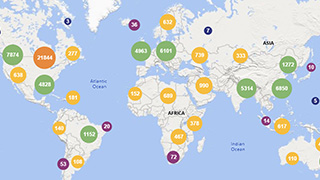Eight Years of Passion and Purpose: Seton Hall’s Journal 'Locus' Reaches 70,000 Downloads Across 182 Countries
Monday, October 13, 2025

Global Downloads Distribution of Seton Hall "Locus" Journal (2018–Present)
With its eighth anniversary approaching, the journal Locus: The Seton Hall Journal of Undergraduate Research is celebrating a milestone. The response from Arts and Sciences undergraduates has been, in the words of one of the founding faculty editors, Nathan Kahl, Ph.D., professor of mathematics and computer science, “gratifying.” “In our eight-year existence, we have had over 100 papers submitted so far, and 62 have made the cut and been published.” What began as a publishing experiment has grown into much more; it has become a platform for students to showcase their research and a valuable training ground for emerging scholars.
For student authors, Locus offers a chance to present their academic research in a peer-reviewed journal, with impressive download statistics. Since 2018, Locus articles have been downloaded more than 70,000 times by readers in 182 countries. “Needless to say, it’s an excellent opportunity for students planning to pursue graduate studies,” another founding faculty editor, Cherubim Quizon, Ph.D., associate professor of anthropology, remarked. “A number of our student authors have featured their Locus publications on their résumé or applications for graduate school. Some of those published papers have been cited by other scholarly and academic works,” Kahl added.
As Seton Hall’s undergraduates prepare to launch the journal’s eighth volume, the spirit of those early meetings in 2017 continues to animate the project. What began with a dean’s idea, the support of the University Libraries, and a group of faculty volunteers has become a publishing tradition with international resonance. And in the words of its founding faculty editors, the work still offers “satisfaction from the work itself,” a reminder that the labor of scholarship, unpaid and often unseen, can change the way students see themselves and how the world comes to see them.
Eight years on, Locus has achieved global reach, impact and reputation. Its works have now been downloaded tens of thousands of times across every continent, reaching more than 70,000 downloads in total. The U.S. leads with more than 32,000 downloads, and readers in the Philippines (5,196), the United Kingdom (4,297), Canada (2,655), and India (2,493) show how far Seton Hall undergraduates’ voices have traveled, rounding out a diverse readership that spans all four hemispheres. Individual works have also become surprisingly influential. For example, Shardai Smith’s 2021 paper published in Locus (Vol. 4, Article 12), “Dismantling Gender Roles and Redefining Womanhood in Louisa May Alcott’s Little Women,” has been downloaded 15,000 times.
From the student perspective, one of the student editors, Leo Chu, said, “What I appreciate most is its openness, how it connects disciplines and gives students a genuine voice. Here, editing is about more than managing papers; it’s about growing as real researchers.” For student editors, the experience is valuable. They work alongside faculty in a collaborative, team-based environment. Most submissions come from the humanities, followed by social sciences, with some years requiring more than one student editor for the humanities section to handle the volume. Science editors also receive training in LaTeX, a professional typesetting and production tool widely used in scientific publishing.
The story of Locus began in 2017, when a small conversation in the College of Arts and Sciences set in motion a publishing experiment, one that has grown beyond its modest origins. At that time, then-dean Peter Shoemaker, Ph.D., professor of French, called a meeting with Quizon and Donovan Sherman, Ph.D., professor of English, to discuss the idea of creating a journal for Seton Hall undergraduates. “The then-dean Shoemaker was interested in creating an outlet for undergraduate research, something that could be shared widely and would showcase the work our students were producing,” Quizon recalled. “During this meeting, I volunteered to bring in a science colleague, and that’s when Kahl joined the team.”
“I was curious about online publishing, so I volunteered to focus on the pre-production side,” Quizon added. Lisa Deluca, assistant dean of public services at the University Libraries, was the guiding hand that turned this vision into reality. As Quizon noted, “Lisa helped us set up our journal on the Bepress platform.” With these essential resources secured, Locus: The Seton Hall Journal of Undergraduate Research was set up to become a nascent journal and an academic platform with a professional infrastructure.
Meanwhile, Kahl and his team of science editors focused on the production side. “Kahl learned the Bepress platform and also trained his student editors to use it effectively,” Quizon explained. The work on the backend, from setting up the journal to producing professional-quality academic research papers, laid the groundwork for Locus’s success in reaching a wide audience.
The journal’s first year was both successful and pivotal. In 2018, Locus published its inaugural Volume 1, featuring 10 student papers — a testament to the enthusiasm and courage of its contributors. During the production period of that year, Sherman was on sabbatical, so his colleague, Russell Sbriglia, Ph.D., associate professor of English, took on the role of the first humanities editor. “That first year was crucial. We learned what worked, what didn’t and when things needed to happen,” Quizon recalled.
In October 2025, as Locus celebrates its eighth anniversary, in addition to the founding editors and partners in University Libraries, the journal acknowledges the contributions of others, including the current humanities faculty editor, Muhammad Farooq, Ph.D., assistant professor of English, who joined Locus this year; the previous social sciences faculty editor, Mark Horowitz, Ph.D., associate professor of sociology; and the many other excellent editors whose dedication has sustained Locus across the years. For information about current and past members of the Locus editorial team, please see the journal’s Editorial Committee.
Categories: Nation and World






